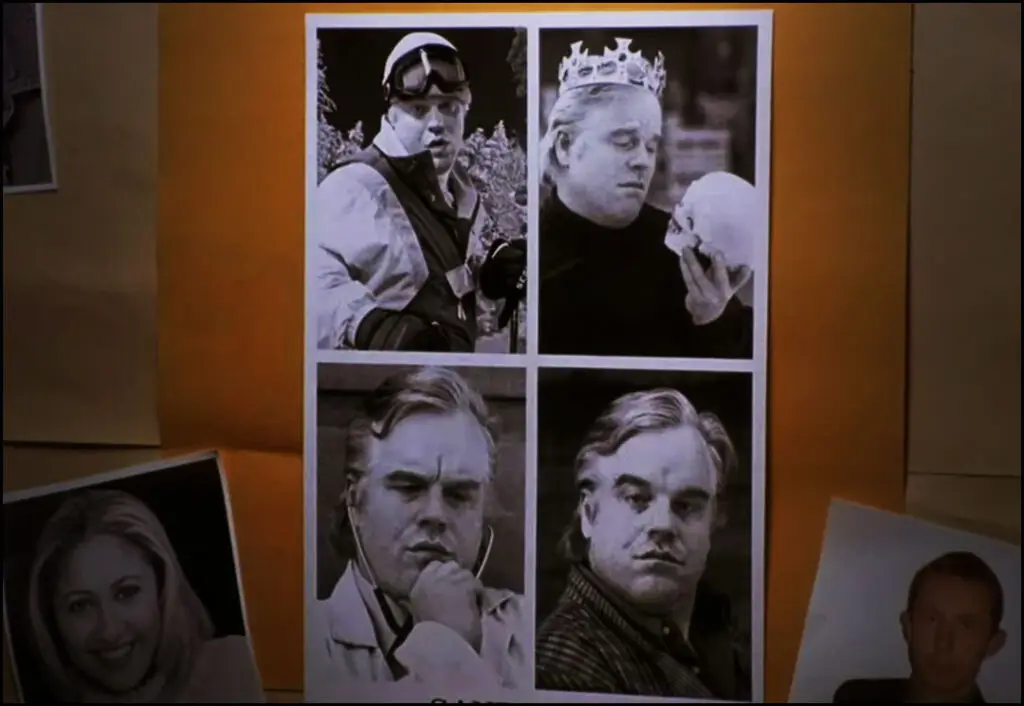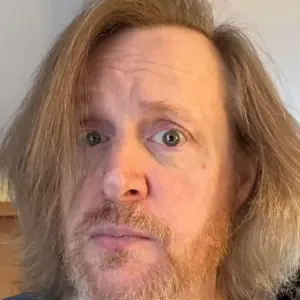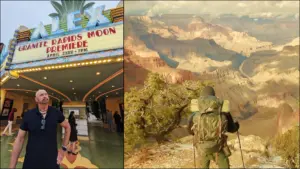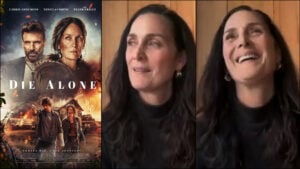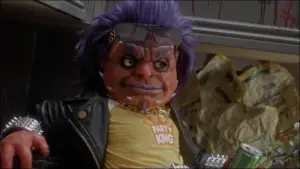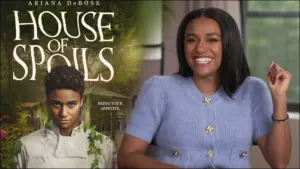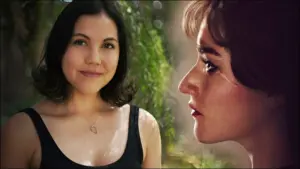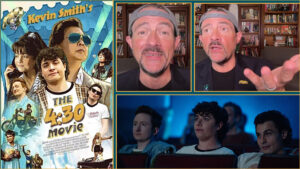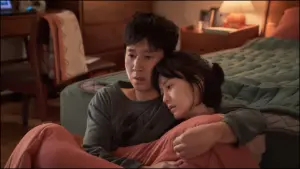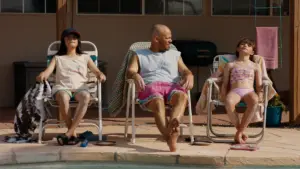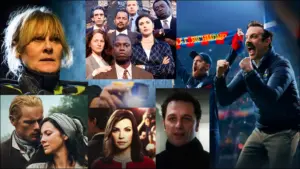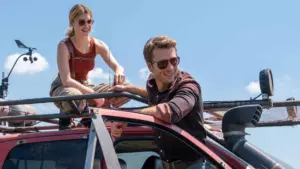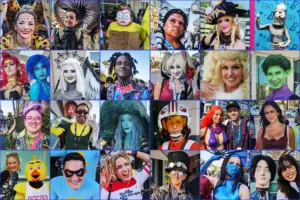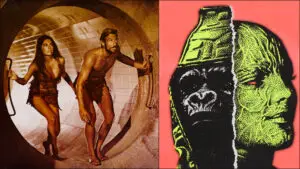Every now and then while revisiting films of the 1990s and 2000s, something pops up featuring actor Philip Seymour Hoffman. Whether he was Freddy Miles taunting Matt Damon’s character by saying “Tommy, how’s the peeping?” in The Talented Mr. Ripley (1999), an awkwardly pudgy script supervisor pining for porn star Dirk Diggler in Boogie Nights (1997), or a theater director spiraling down recursive reality for writer/director Charlie Kaufman’s Synecdoche, New York (2008), Hoffman often stole the show.
In 2014, Hoffman died of an overdose at age 46. A decade later, his intuitive and inherently likeable on-screen presence is still missed.
I like to remember Hoffman during his heyday, as a rising favorite of indie-movie fans. Back in 2004, a group of such fans devised a festival of Hoffman’s films at a movie theater in Tucson, Arizona. They invited Hoffman himself and to their surprise, he accepted, joining the crowd to watch not just his work but his own childhood favorite, the original Bad News Bears (1976).
Hoffman had just enjoyed one of his biggest box-office successes yet, as the sidekick to Ben Stiller in the romantic comedy Along Came Polly (2004). In that movie Hoffman played an unreliable and obnoxious amateur thespian, accompanying Stiller to a party as his “wingman,” then promptly disappearing. Returning a few minutes later, Hoffman interrupts Stiller’s flirtations with Jennifer Aniston’s charcter because, as Hoffman’s character crudely confides, “I sharted,” ushering that slang term into the mainstream lexicon. Only a year later, Hoffman would win the Academy Award for Best Actor playing the lead in Capote (2005). (Coincidentally, director Richard Linklater released a Bad News Bears remake that same year.) A year after that, Hoffman appeared as the villain opposite Tom Cruise in Mission Impossible III.
Writing for the Tucson Weekly alternative newspaper, film critic James DiGiovanna interviewed Mr. Hoffman prior to 2004’s Philip Seymour Hoffman Film Festival. With DiGiovanna’s permission, an expanded version of that interview is reprinted below. –Editor
—
The Talented Mr. Hoffman
Philip Seymour Hoffman, on his way to The Loft, talks about everything from ‘The Bad News Bears’ to kissing Mark Wahlberg
This weekend, Philip Seymour Hoffman will be in Tucson to show some of his films, answer some questions and host a fund-raising dinner for The Loft. Tickets for all events are available at The Loft, including–and especially–a Saturday morning showing of The Bad News Bears, introduced and hosted by Mr. Hoffman.
James DiGiovanna: It’s a real honor to talk with you. I think you’re one of America’s finest actors.
Philip Seymour Hoffman: Oh, thanks. Thank you.
JD: Is it OK if I misquote to make you look anti-American?
PSH: Yes. (laughs)
JD: Great. This week, at The Loft, you’ll be hosting screenings of Magnolia, Almost Famous, Owning Mahowny, Talented Mr. Ripley and Bad News Bears. So, seriously, The Bad News Bears?
PSH: Well, I picked The Bad News Bears because I think it’s fun. And I didn’t want all the films to be me. I feel weird enough showing that many films of mine. Meaning that I’m flattered, I’m excited to go, but there’s a part of me that’s, you know… That much attention I think would make anyone feel a little odd sometimes.
When we were picking the films, I was in New York, or Boston, somewhere, and I was flipping through the channels. Bad News Bears was on. That’s the kind of movie you fall upon every few years somehow — at least I do — and I just think it’s one of the great films. (laughs) I just can’t get over how amazing it is every time I watch it. And I don’t think they make movies like that anymore.
JD: What do you think sets it apart from modern films?
PSH: It’s a film that they try to remake all the time. It’s like one of those films that was made so well, and they’ve been trying to capitalize on the success of that film since. It’s kind of like the first Rocky movie.
JD: Rocky?
PSH: Yes, Rocky is an art film about something commercial. And that’s what Bad News Bears is; it’s an incredibly believable film; it’s shot extraordinarily well; it’s wonderfully acted; and the writing is superb. It’s really moving, and it’s truly funny, and it’s all those things that you want films to be that come out of Hollywood. And I think that you rarely see a film like that. These days, you’re not going to see Walter Matthau driving in a convertible with the top down drinking a beer and smoking a cigar with a bunch of kids in the car. That wouldn’t be happening in a Hollywood movie. But it also seems to me a really strong difference between then and now, in films coming out of Hollywood, and I do think it’s a film that speaks of an era that’s gone.
JD: An era of filmmaking, or an American era?
PSH: An American era. It’s about my childhood. Adults drank a lot more; they smoked in front of you. It was a different time. Drinking beer in the car and driving wasn’t as big an issue in 1975. Those kinds of behaviors were more of the norm when I was a kid, if I recall. And now we live in a much more PC world. A lot of those things are shunned for very good reasons, but there was a certain laissez-faire attitude about all that stuff back then, and so, how that story unfolds, and how adults treat children and children treat adults in that film is really … it’s really appalling! It’s appalling, and you still find humor in it, and you also find a lot of drama in it, and both of them work.
You know, and Tatum O’Neal’s like, an 11-year-old girl selling those star maps? I mean, it’s ridiculous! and Walter Matthau makes her pitch these curve balls which are ruining her arm, you know? I just think the movie’s amazing, and I just don’t think it would be made today. Now we’re living in a day and age, if you don’t make $100 million with a big-budget film, you’re a failure. That’s kinda awful.
JD: I think one thing that happened is at that time the studios were a little more hands-off on films. There wasn’t so much focus-grouping and so on. And then after Star Wars, in the 1980s, you saw the more producer-controlled films for a while.
PSH: Yeah, I think that’s part of it, and I also think the movies like Bad News Bears, or Rocky, or Jaws, became incredibly successful commercially and created the blockbuster.
JD: One thing that happened in the ’90s is you saw a lot more independent cinema, which returned to the pre-blockbuster sensibility of the ’70s in some ways. And you were in a lot of those films. Did you aim for ’70s-style performances?
PSH: I agree with you that the ’90s had a creative resurgence. Mainly I followed scripts that spoke to me, choosing characters that jumped out at me. One of the earliest was about, say, 8 or 9 years ago, when I was really getting involved in the independent film scene, I was up for the role in Happiness [Todd Solondz’s 1998 black comedy, in which Hoffman plays a depressed, loveless man.]
With Paul Thomas Anderson [director of Boogie Nights], I had seen one of his short films, which led to my role in his film Hard Eight (1996).
I did see Richard Kwietniowski’s Love and Death on Long Island (1997) before I agreed to star in his Owning Mahowny (2003). But most of the time I was working with directors who, I either hadn’t seen their work, or I’d seen maybe one of their films. So I really had to follow and trust the script. If the script excited me, I’d hope for a great director, instead of choosing the director and hoping for great script.
JD: About those scripts … why did you pick Magnolia, Almost Famous, The Talented Mr. Ripley and Owning Mahowny?
PSH: For the diversity. I think there’s a diversity in character; I also think there’s a diversity in filmmaking, ranging from a really hard-core independent style, to a kind of broader commercial picture. Those were really the two criteria: diversity of filmmaking and diversity in characters.
JD: Are there are any films you’ve done that you ended up not liking?
PSH: Yep! But, you know, I don’t like really talking about those films specifically. It’s, you know… (laughs)
JD: Let me ask you about your acting background. You come across as a more studied actor than most, with a lot of range.
PSH: For about six years, I studied a lot of the basics — the groundwork of acting, which includes actions, objective, givens, what came before, what are your needs. I think every actor needs to establish those things. Then I studied a lot of, you know, other things that I took into my own realm, made my own: sensory work, stylization, the classics. The idea for me is to keep exploring and keep trying different things.
JD: If you saw Keanu Reeves at a party, what tips would you have for him?
PSH: I don’t think there’s anything Keanu doesn’t know. I mean that.
I heard he went and played Hamlet at some theater once, and I see the things he does, and it’s like, he’s just another actor struggling to try to get better. And I am, too. I just don’t get into that “he’s someone to put down” kinda thing. And I’m not saying that’s what you’re doing, but…..you know what I mean?
Acting’s a really hard thing to do, after all, and some people, I think, do it easier than others. But I do think that some people get better, and I also think some people do take it seriously, and I have a feeling he’s somebody who probably does, that he struggles like everybody else to try to do it well. But if I saw him, I’d probably ask him for tips, to be quite honest, my friend. I’d be like, “So, how did you get in that first Matrix movie? How’d you swing that?”
JD: You’re not getting the 20 million dollar paycheck per film…
PSH: Which I don’t want, but there’s both sides of the coin, and a compromise to be made there.
JD: But you’re not aiming at a blockbuster, apparently.
PSH: Oh no, no, no, no. But ending up in one is not a bad thing. I get offered them, and I’ll say no if I don’t like the part. But there are those opportunities that are worth taking, like The Matrix — I like that movie. So I’d ask Keanu, “How’d you get that job?”
JD: You’d have been good as Neo. They should have cast you.
PSH: (laughs) Yeah, right! I’d have had to get in good shape for that one, that’s for sure.
JD: Do you get offered a lot of parts as villains in superhero comic-book movies?
PSH: No, but I get offered, you know, the buddy in a big ol’ Hollywood picture, you know what I mean? Those parts come around to me. I’m just not doing those things too often.
JD: Who would you like to work with in terms of directors that you haven’t worked with?
PSH: I don’t know, I think there’s a lot of… (yawning) I’m sorry, excuse me, I was up till 4 o’clock in the morning with this play…. I uh…
There’s, I think, a lot of directors doing great work. You know, whoever’s the next one I work with is the next one I wanna work with. But I’m still kinda the guy who is following the script. You know what I mean? If the script I’m working on isn’t really right for me, then what’s the point?
You know, it’s always surprising to me what’s the next thing that I’m going to really get turned on by. But I do think there are a lot of directors out there that are doing really fabulous stuff.
JD: Yeah I think it’s a good time in movies right now.
PSH: Yeah I do too.
JD: So, of the TV show remakes, which part have they offered you: Epstein, Wojo, Schneider? Father Mulcahey? They offer you Father Mulcahey? [Note: Father Mulcahey was the Army chaplain in the comedy TV show MASH.]
PSH: (laughs) Father Mulcahey…. No I don’t know if I’ve been offered a TV show. I might be up for more of a superhero movie thing. Maybe Catwoman….
JD: Oh, you’d be a great Catwoman!
PSH: I don’t think I was actually offered that, though.
JD: They didn’t offer you Catwoman?
PSH: I think they were interested in me playing the villain in that at one time, and then they cast some other guy [probably Lambert Wilson, in 2004’s Catwoman –ed]. But uh… Yeah, no nothing like that yet.
JD: So uh, I won’t keep you too long, I know you’re tired, but, what project would you really like to work on — is there anything you’ve wanted to do for a while?
PSH: I have a bunch of projects that I’m trying to get made right now. Um, I’m trying to…. there’s a script about Truman Capote that I’d like to do.
JD: Isn’t that in production, the Capote one?
PSH: It’s in pre-production. But we haven’t… We’re still raising the money.
JD: And you’d be playing Truman Capote in that?
PSH: Yeah. And uh… That, and uh, there’s this film called Disturbing the Peace, based on a Richard Yates novel, which I really would love to do. [This film did not happen, but another Yates novel, Revolutionary Road, was adapted to film in 2008, though Hoffman was not involved. –ed]
JD: You’ve been fairly prominent in films for about 10 years now. Do you think they owe you an Oscar at this point? [Hoffman would go on to win an Oscar a little over a year later.]
PSH: No, no one, no, ah, no…. (half-way laughing) No, no, be careful what you wish for, know what I mean? That’s what I say to that kind of thing. When something like that comes around, I’m sure it’s very exciting and very flattering and all of that. But I do always say: be careful what you wish for.
JD: So now that you’re like a big Hollywood star, is your typical day: You wake up, kick the 17-year-old starlet out of bed, yell at your staff until they bring you the roasted baby seal, that sort of thing?
PSH: No, no, mine right now is sitting here watching my 14-month-old son babble his way across the room, and my girlfriend being mad at me because I’m working too much at the theater (laughs). That’s my life right now.
JD: Punch-Drunk Love (2002), let me ask you just quickly about that one. Generally the characters you play tend to be sort of these losery guys, whereas in Punch-Drunk Love, you play a very aggressive character. Were you surprised you were offered that part, or did you interpret it in a different way?
PSH: No, the way the part was written, I had to play it that way. There were two other roles that John C. Reilly and I were going to play in that movie. Those got cut, and somebody else was supposed to play the role I played, and that person didn’t want to do it for some other reason, so Paul [Thomas Anderson] cast me in that role, and uh….so that wasn’t the plan.
Yeah, it’s a good role, you know… That kind of guy is something that I know just as well as anything else — raging lunatics, you know what I mean? Not a lot of parts for raging lunatics.
JD: Do you feel like you get typecast at all?
PSH: Yes, I feel like sometimes people see me in certain ways like that, but it’s not really a problem. I just say “no” if I don’t want to take a role. And that’s hopefully what this thing will be about at The Loft, with the different characters in Magnolia as opposed to Owning Mahowny as opposed to Almost Famous as opposed to Talented Mr. Ripley. In that one, my character has a lot of rage, but he’s educated and savvy and clever. But his rage is not any less. And his aggression and his self-assuredness, his confidence and his behavior are very different, from, say, the character in Magnolia. That’s the point of the choice of the movies, is that as an actor, you can really try to do a lot of things you want to, and work in a lot of different styles with a lot of different directors and stories and periods. That’s really one of the joys of the profession I’m in, is that you gotta really make those decisions to make that happen.
JD: You made a documentary, The Last Party, about the 2000 presidential election. What did you learn from that?
PSH: I made that documentary more for myself and people like me–meaning people who want to learn more about what goes on. You’re dealing with the campaign, and watching nominees running for president, how to follow it and inform yourself and really know what’s going on, and all the places you can go and look to learn those things. (You) become somebody who actually gets excited by the voting process and doesn’t feel alienated from it or distanced from it, and learn from the mistakes and be aware of them to make a healthier choice. There’s nothing in there that anyone doesn’t know. And if somebody doesn’t know, they should find out. If you’re not interested, then you’re missing out. So pick up a paper and read it; go online; go to the rallies that you hear about; hear the information; subscribe to some periodicals that some other people don’t read; get The Nation, pick up your free newspapers that are going to be a little more radical than the next. That’s all I’m interested in, is that people are interested in that kind of thing, whether it’s conservative or liberal, at least know what you’re talking about. If you don’t, be curious to know.
JD: And what’s it like to kiss Mark Wahlberg?
PSH: It’s fun. Yeah.
JD: Not a bad kisser then?
PSH: No, no …
JD: Where would you like to see American films go now?
PSH: I don’t know. I just know that I think it’s a good time right now. I think you’re really seeing right now the big-budget Hollywood films faltering because of the success of the films that aren’t like that. I think you’re seeing people like Spike Jonze and those people that have come in–Paul Thomas Anderson, Coen brothers, directors who have come in over the past 10 years who really staked a claim in the commercial big-budget market with very independent artful fare, and made that another option. It’s not a given that a big-budget movie with big stars is going to make the money. Doesn’t seem to be happening the way that it used to, through the ’80s and even through part of the ’90s. So what I’d like to see is more of what’s happening, and if you’re gonna make that film, that big ol’ commercial film, make it like Bad News Bears.
JD: Like, with a real script?
PSH: Yeah. Bad News Bears is so believable. I watch that movie and I feel like I’m 10 again. There’s sprinklers going on, and the cut lawn, and how wonderfully believable those kids are, and how awful they are. It’s just fantastic.
JD: So they’re willing to show something a little disturbing, I guess.
PSH: Well, no, I don’t think it’s even disturbing, I think it’s just a certain amount of truth. You know, truth gets cut out for the benefit of a story, or not to offend people. The film’s not disturbing; the film’s just incredibly truthful. The film deals honestly with the fact of what it’s like to be a child in the suburbs involved in Little League. It’s really competitive. Adults get really nasty when that happens. It’s true, and it’s part of our world, so why are we gonna be so shocked by it? I think it’s the exact opposite of disturbing; it’s heartwarming. That film ends up being incredibly heartwarming.
JD: And you think we would lose a lot of those elements because the studios are worried about offending someone?
PSH: I think so. I think you’re not going to see a big-budget film with an adult drinking a beer, smoking a cigar, with the top down, and five kids in the car. That ain’t happening today unless it’s in independent fare. That’s not going to come out of a major studio.
JD: All right, thank you very much for talking to me, it’s been a real privilege. I think you’re a great actor, and I hope the screenings go well.
PSH: All right, thank you very much. I appreciate it.

